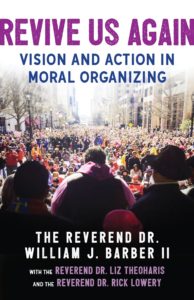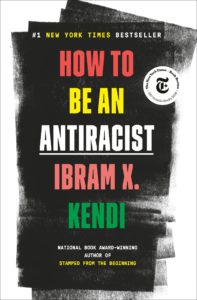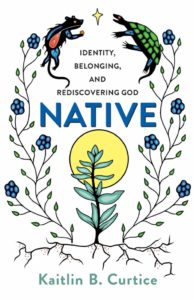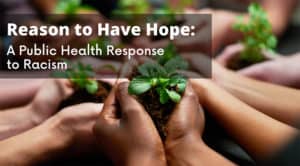CHHSM’s ‘Together We Learn’ Book Groups Create Safe Space to Discuss Race, Diversity, Equity, and Inclusion
On June 4, 2020, following its spring board meeting, the CHHSM board of directors released its Statement on the Pandemic of Systemic Racism. Among the many commitments the board made to help CHHSM become antiracist was the creation of a Zoom book study group.
From that inauspicious beginning has grown a series of book groups to help participants learn more about and develop an understanding of institutional and systemic racism, and to work towards becoming antiracist. The Together We Learn series will delve into its fourth offering later this year.

“I am really pleased to announce that the next book we read will be Revive Us Again: Vision and Action in Moral Organizing by William Barber, which should help us on the journey we are taking toward increased understanding and increased action,” said the Rev. George Graham, CHHSM vice president. “Watch for more information about this new study, which will begin late in August, in the coming weeks.”
Over the past two years, the book group has become a vehicle for not only education but advocacy. “The name of the group, Together We Learn, says so much. The sense of community and being together has made the group a touchstone for me,” Graham said. “There is a sense of movement in the group as a result of the learning we are doing, from growing in our understandings about institutional racism to challenging ourselves to find concrete ways to take action.”
For Roger Meiller, retired director of church relations for CHHSM member EHM Senior Solutions in Saline, Mich., participation in the Together We Learn groups has “given me the opportunity to stop and look at racism and my place in continuing inequities.”
Meiller has been a part of all three book groups to date: exploring Ibram X. Kendi’s book How to Be an Antiracist in late summer/early fall 2020; examining Kaitlin Curtice’s book Native: Identity, Belonging, and Rediscovering God in spring 2021; and discussing CHHSM’s Reason to Have Hope: A Public Health Response to Racism online course — created by the Rev. Dr. Elyse Berry, CHHSM’s associate for advocacy and leadership development — from September 2021 through March 2022. For him, the book groups have been a progression of understanding.

“When the announcement about Together We Learn was made, I knew this would be a chance to continue conversations with CHHSM members and friends as well as educate myself about the insidious way in which racism has manifested itself in our culture, and in me,” he said. “The first book [by Kendi] began to open my eyes, and the next book [by Curtice] added the dimension of looking at the impact of racist policies on Native Americans. When the third group [on the curriculum] was proposed, I knew I needed to continue that journey. Being able to meet with people from around the country and hear of the efforts undertaken where they live and the challenges of making significant changes to the cultural narrative continued to be what drew me along the path.”
One of the most pleasant surprises of Together We Learn has been the composition of the groups. “The groups have incorporated people from local congregations and UCC association/conference staff in addition to CHHSM members,” said the Rev. George Graham, CHHSM vice president. “Our hope is that this trend will continue as CHHSM adds new offerings to the book group series.”
For Cindy Ball — a lay leader at St. Pauls UCC in Chicago who chairs its anti-racism committee — the Reason to Have Hope discussion group was a rewarding experience. “The depth of information was so extensive and so well researched and curated,” Ball said. “I appreciated the time and freedom given to go through the material at my own pace, and to know I have ongoing access to go back into the Reason to Have Hope material, which I have done. Even more, I appreciated being part of a group going through and responding to the material.”
In particular, Ball added, was the safe space in the group. The CHHSM team “created a safe space for everyone in the group to openly and faithfully wrestle with the material and its implications in our own lives. I felt fortunate to be among such honest, deep-thinking individuals and trust that I could reach out to any of them to connect thoughtfully on issues of concern to me.”
Reason to Have Hope also resonated with Essence Ellis, the first CHHSM/Justice and Local Church Ministries UCC Fellow. “The Reason to Have Hope sessions were amazing,” Ellis said. “It was the first book group I participated in with CHHSM, and it was great to be able to journey through the course with consistent conversation partners that made for a wonderful experience. I was so grateful that Elyse, who created the course, was able to facilitate for us. Everyone was so thoughtful about being a part of this conversation. And everyone seemed to be learning new ideas and concepts to think about and apply to our daily lives!”

Bruce Roller, executive director of United Church Outreach Ministry in Wyoming, Mich. — who participated in the Native and Reason to Have Hope groups — agreed. “From the beginning, I was impressed with the humility of the group sharing thoughts and accepting empathetic questions and push back,” he said. “This made the group feel like a safe place to share ideas and feelings as we explored the book together. Ideas were brought forward that I would not have thought of, and those gave me greater insight into the thoughts and feelings of the book. The openness and vulnerability of the facilitators and the group gave me a bonding experience that still holds.”
Though at times difficult, the discussions generated from the books to date have generated a sense of hopefulness in participants.
“Both of the studies in which I participated strengthened my faith in humans — that we are capable of far more than just ‘civil’ conversations around difficult issues,” said Roller. “We are really able to empathize with each other in our continuing journey. Feeling supported and valued by the other people in the group made my spirit soar from time to time.”
Ball concurred. The curriculum story “gave me resources not only to better understand the issues, but also to hope and cope with them, and connections to continue learning and growing beyond our time together,” she said.

Commenting on the Reason to Have Hope group, Meiller added, “The real hope was to be found in the discussions, the honest sharing and vulnerability, and knowing there were indeed people all over who were working in their agencies and communities to make a difference.”
The book groups have “given me the opportunity to stop and look at racism and my place in continuing inequalities, if for no other reason than I am a straight, white male,” said Meiller. “I have benefited from the readings and discussions by becoming more aware of ways in which my thoughts and actions and unexamined white privilege have perpetuated racial stereotypes and microaggressions.”
Meiller also recommends the curriculum to others. “It is easy to take the material offered and go further with the suggested links, as well as just explore the questions the material raises,” he said. “It has expanded my perspectives in my observations of and interactions with others, which results in change, including greater patience within myself, as well as grace and spaciousness towards others.”
Roller agreed. “I highly recommend that everyone with a heart for learning and growing spiritually and emotionally get involved … and put your whole self into it,” he said. “The experience is well worth the effort. I’m looking forward to the next Together We Learn gathering.”
Join Our Mailing LIst
"*" indicates required fields
Follow on Facebook
Pension Boards appoints David A. Klassen as its President, CEO - United Church of Christ
www.ucc.org
The Pension Boards, an affiliated ministry of the United Church of Christ recently announced its appointment of David A. Klassen as its next President and